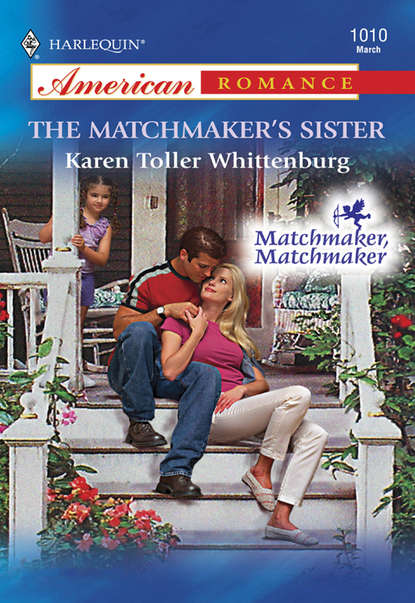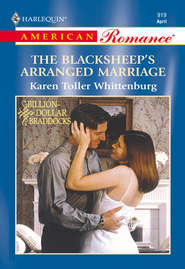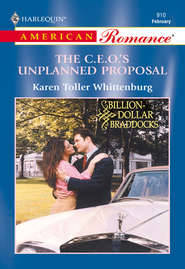По всем вопросам обращайтесь на: info@litportal.ru
(©) 2003-2024.
✖
The Matchmaker's Sister
Автор
Год написания книги
2018
Настройки чтения
Размер шрифта
Высота строк
Поля
“Are we going somewhere?” Kori asked as she tried to catch several fast-moving drips of Popsicle.
“If you’ll recall,” Nate said, “I told you guys I’d take you downtown this afternoon and show you the building we’re going to renovate for our coffeehouse. Since you’re all up and dressed already, I’ll take you out for brunch on the way.”
Cate and Will exchanged a look. Kali and Kori ducked their heads and popped what remained of their Popsicles into their mouths. Not exactly the eager response Nate had imagined.
“Oh, come on, it’ll be fun. The coffeehouse is gonna be great. You’ll be able to bring your friends and listen to music and drink sodas and eat muffins…and…” Truth was, Nate wasn’t entirely sure himself what exactly went on in a coffeehouse, but he’d imagined it as a good way to occupy his children, give them an insider’s view of entrepreneurship and a decent work ethic, provide him with a good excuse to spend lots of time with them, keep their hands busy and allow him to keep an eye on them and their friends. It was one thing for their mother to have granted them the freedom to be “who they are,” quite another for their father to be comfortable with their choices. “It’s really a cool place,” he said, coaxing, hopeful. “And I want your help in choosing paint and decorations and chairs and stuff. I need your help. This is a family project, remember?”
The ensuing silence told him what they thought of his idea. But he pretended not to notice anything out of the ordinary. Come to think of it, this behavior was pretty normal for them. But they’d come around. He was sure of it.
“But I told Ariel—” Cate began.
“Ariel can come with you,” Nate offered generously. “This will be a lot more fun than going to the mall. In fact, you can all bring a friend. The more the merrier.”
He could see they wanted to argue, probably would argue as soon as they figured out the best angle. But they were, as Angie had often remarked, great kids and they didn’t say anything. Not now, anyway. And not out loud.
“What time do we have to go?” That was Will asking. As if any time would be too soon.
“Eleven?” Nate suggested. “That gives you plenty of time to…uh, brush your teeth. And change your clothes. If you want. Or ask a friend to join us.” He smiled his broadest “Father-Knows-Best” smile. “We’re going to have a great time together.”
“Great. Just great.” Cate flounced toward the door on a sigh, her fringe fluttering with displeasure.
“Just great!” Taking their cue from her, the little girls pushed away from the table and stalked after their sister, carrying their sticky orange Popsicle sticks with them and leaving their sticky orange fingerprints on the table.
It was just the men then, father and son, and Nate looked at Will expectantly.
“Girls are stupid,” Will pronounced in his squeaky, changeable voice as he bypassed the freezer and the Popsicles and went straight for the refrigerator and the orange-juice carton. The whole carton, apparently, as he simply opened the spout and took a drink.
Nate would have protested both the observation and the action, except that at thirteen he’d found girls unfathomable, too. He’d also gotten drinks directly from the carton despite being chastised for it repeatedly. Which didn’t mean he shouldn’t make it an issue. Only now didn’t seem to be the prime time to make an issue out of orange juice. “I’ve been thinking,” he said conversationally. “Maybe we could paint the coffeehouse black and call it the Black Sheep? Do you think the girls would go for that?”
Will took another swig from the carton, his somber expression never altering, the traces of the precious little boy he used to be lingered despite the spiky hair and the low-riding denim. “I think we’re all pretty much going to hate it no matter what you call it, Dad.”
Then he put the orange-juice carton back in the refrigerator, grabbed the milk carton, hooked a bowl with one finger, tucked the cereal box into the crook of his arm and shuffled out of the kitchen.
Nate decided not to think about how his son would manage without a spoon and concentrated instead on his new appreciation for the silence. Taking a sip of his tepid coffee, he went back to wondering what Miranda Danville was having for breakfast.
“WHAT HAPPENED to you?” Ainsley asked, her voice sly with innocence.
Miranda didn’t even look up. She simply continued leafing through the wedding planner she’d bought on the way to her sister’s office. “Did you know,” she said in a very conversational tone of voice, “that the best photographers and videographers are booked over a year in advance? Same thing with the better florists and caterers. Hmm.” She smoothed her hand across the page, made a note in the right-hand corner. In pencil. “That does make sense, I suppose.”
“We’re not postponing the wedding,” Ainsley said firmly, although just as conversationally. “And you didn’t answer my question.”
“About the caterer?”
“About what happened to you at Scott’s wedding.”
“Nothing happened to me at Scott’s wedding, except that I went home a bit hungry. We are definitely not using that caterer at your wedding.”
“You know what I meant,” Ainsley persisted.
Even as a tiny child, Ainsley had been persistent. Persistently happy. Persistently cute. Persistently persistent. She was the baby of the family, the last born, arriving over an hour after Andrew made his entrance, in no great hurry to dazzle the world with her impulsive presence. Baby, as the whole family sometimes called her, was everyone’s favorite. Even Miranda, who had borne the major responsibility for mothering all three of her siblings, had never been able to deny Ainsley much of anything.
Miranda still found it difficult to believe her sister had a real job. Of course, there was some credibility to the argument that matchmaking wasn’t a real occupation and being a matchmaker’s apprentice wasn’t a real career option. IF Enterprises didn’t front for an Internet service that put two people, who’d signed up to be matched with someone…anyone—in touch with each other. IF Enterprises didn’t advertise, didn’t videotape prospective singles and didn’t have a standard fill-in-the-blank questionnaire and application. Ilsa Fairchild, the founder and main matchmaker, was very careful about the clients she agreed to help. Her service was sophisticated, selective and involved in-depth research into each individual’s background, likes and dislikes, and romantic history. Research alone sometimes took months, but when Ilsa introduced a client to the possibilities of a romantic relationship, she knew what she was doing.
She had an unheralded record of success, despite the fact that her name was merely a reverent whisper in the ears of New England society. Parents or grandparents with independent-minded children came to Ilsa in private in the hope she could and would agree to arrange an introduction of possibilities for their offspring. Bachelors and debutantes, widowers and divorcées, came to her for advice and assistance in matters of the heart. IF Enterprises was the crème de la crème of matchmaking services and Miranda was still amazed that Ainsley had convinced Ilsa to take her on as an apprentice. And, despite having a little trouble with the discretion requirement, Ainsley seemed to be thriving in this fairy godmother kind of career.
Which was all the more reason for Miranda to keep her own counsel about Saturday night’s encounter with Nate Shepard.
So she merely poised her pen over the planner and looked at her sister over their narrow metal frame. “We have to make some decisions about your wedding, Ainsley. Let’s not get sidetracked by something you imagine happened to me at Scott’s wedding.”
“I saw you, Randa, so tell.”
“There is nothing to tell,” Miranda repeated because it was true. And because she wanted it to be true. “Nothing happened.”
Ainsley had a magnetic smile…lots of teeth, lots of gum, lots of sparkle…and she flashed it now, her blue eyes, so like their mother’s, so like Miranda’s own, shining and steady. “You are such a liar, and despite the fact you’ve been repeating for two whole days that nothing happened, I saw you dancing with him and I know something was going on.”
Miranda made another note in the margin of the planner. Just a squiggle, nothing she’d ever be able to make sense of later. But it was in pencil and could easily be erased. “You’re imagining things again, Ainsley, and frankly, I don’t have all day to spend nailing down some of these details.”
“I’ll nail down all the details you want as soon as you’ve answered my question. You know how curious I am. You know I can’t stand not knowing. You know I won’t be satisfied until you’ve told me the whole story.” She thrummed her fingers on her desktop…as patiently as she ever did anything. “I am your sister. You know you can trust me with the details.”
Miranda laughed, because Ainsley was not known for her discretion. Or her attention to detail. “Does Ivan know what a provoking child you can be?”
“Ivan knows I’m not a child,” Ainsley said. “Someday I hope you’ll figure that out, too. And you still didn’t answer my question.”
Miranda wasn’t altogether comfortable with her baby sister lately. Ainsley had always looked up to her, depended on her, and although Miranda had been anticipating the time when none of her siblings turned to her to solve their problems, now that the time had come, she was finding it a trifle unsettling. She closed the wedding planner with a sigh. “What exactly do you want to know?” she asked. “And I know you, Ainsley. You’ve been very busy the last two days, ferreting out all kinds of information about Nate, so let’s cut to the chase, all right?”
Ainsley’s smile swagged like the Cheshire cat’s. “I want to know what you thought about him. I mean, he’s handsome. Not like his brother, of course, who is matinee idol/Roman God/too-perfect-to-be-real handsome, but I thought your fella was…well, distinguished-looking. Very attractive in a…distinguished sort of way.”
“Yes,” Miranda said, wondering if she would have to actually say anything else or if Ainsley would do all the talking.
“His wife died, you know.”
“Yes.”
“He’s twelve years older than Nicky.”
Miranda merely arched an eyebrow at that. No point in acknowledging the obvious.
“I think older men are underrated.”
“That could be true.”
Ainsley’s forehead furrowed with curiosity. “So?”
Вы ознакомились с фрагментом книги.
Приобретайте полный текст книги у нашего партнера:
Приобретайте полный текст книги у нашего партнера:











